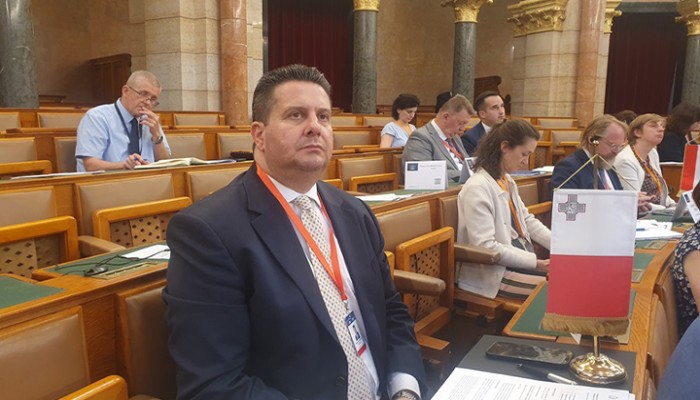
On July 29, the Hungarian Országgyűlés, the National Parliament of Hungary, hosted a meeting of the Chairpersons of EU Affairs Committees. The meeting was the first held as part of the programme of conferences in the inter-parliamentary dimension of the 2024 Hungarian Presidency of the Council of the European Union.
The conference consisted of two main sessions. János Bóka, Minister for EU Affairs of Hungary, presented the programme and priorities of the Hungarian Presidency of the Council of the EU. During this first session, Edward Zammit Lewis argued that, with regard to migration policy, it is important that the Mediterranean remain central to the policy of the EU on these issues. On competitiveness, Edward Zammit Lewis stated that it is important that the EU continues to push to overcome the periphery and connectivity challenges. He concluded his intervention by stressing that the EU should continue to focus on the issue of the Middle East and support a two-state solution as the only permanent solution to the Israel-Palestinian conflict. On Ukraine, the Chairperson of the Foreign and European Affairs Committee stressed that the EU should always speak with one voice.
The second session dealt with the current enlargement process of the EU. Keynote speeches were given by Olivér Várhelji, Commissioner for Neighbourhood Policy and Enlargement, and Péter Sztáray, State Secretary of the Ministry of Foreign Affairs and Trade of Hungary. Addressing this session, Edward Zammit Lewis agreed with the European Commission on the issue of gradual integration and that acceding states need to feel the benefits of membership even before accession. On the other hand, it is crucial that candidate countries fulfil their duties in the areas of respect for human dignity, the rule of law, and equality, amongst others, in line with Article 2 of the Treaty of the European Union, which has been enforced through important case law by the EU Court of Justice. He also referred to the aspects of security and stability that enlargement will bring to the Union. He acknowledged that the EU needs to prepare itself to be able to welcome new member states. It is, however, equally important that small states, like Malta, maintain their effectiveness in the decision-making processes of the Union. Therefore, reforms in this regard need to be addressed with great caution.
On the margins of the conference, Edward Zammit Lewis met with Maka Botchorishvili, Chair of the Committee on European Integration of Georgia. The discussion focused on the current political situation in Georgia in light of their current ‘candidate status’ with the European Union.
By commenting you are accepting our Comment Policy.